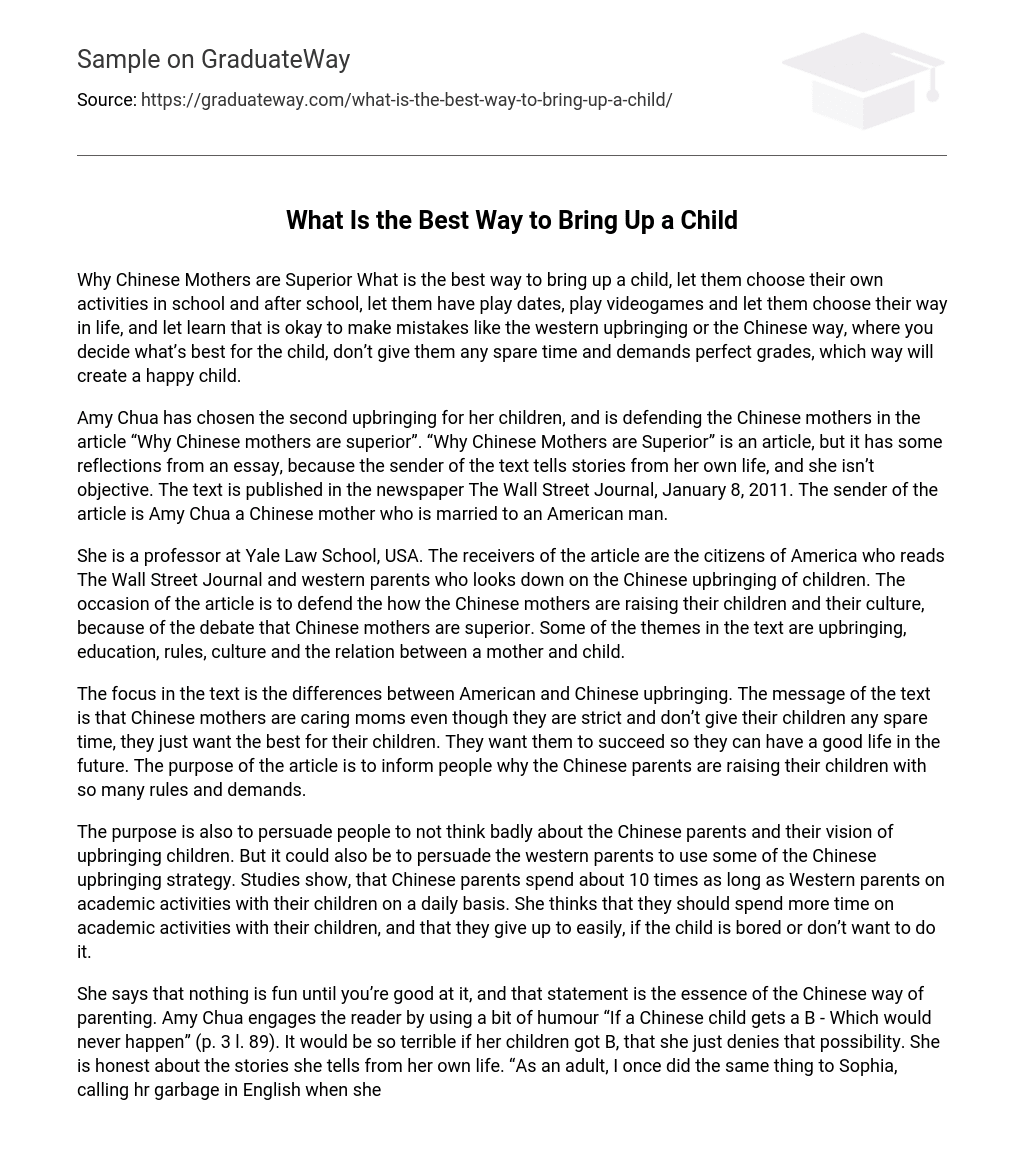Why Chinese Mothers are Superior What is the best way to bring up a child, let them choose their own activities in school and after school, let them have play dates, play videogames and let them choose their way in life, and let learn that is okay to make mistakes like the western upbringing or the Chinese way, where you decide what’s best for the child, don’t give them any spare time and demands perfect grades, which way will create a happy child.
Amy Chua has chosen the second upbringing for her children, and is defending the Chinese mothers in the article “Why Chinese mothers are superior”. “Why Chinese Mothers are Superior” is an article, but it has some reflections from an essay, because the sender of the text tells stories from her own life, and she isn’t objective. The text is published in the newspaper The Wall Street Journal, January 8, 2011. The sender of the article is Amy Chua a Chinese mother who is married to an American man.
She is a professor at Yale Law School, USA. The receivers of the article are the citizens of America who reads The Wall Street Journal and western parents who looks down on the Chinese upbringing of children. The occasion of the article is to defend the how the Chinese mothers are raising their children and their culture, because of the debate that Chinese mothers are superior. Some of the themes in the text are upbringing, education, rules, culture and the relation between a mother and child.
The focus in the text is the differences between American and Chinese upbringing. The message of the text is that Chinese mothers are caring moms even though they are strict and don’t give their children any spare time, they just want the best for their children. They want them to succeed so they can have a good life in the future. The purpose of the article is to inform people why the Chinese parents are raising their children with so many rules and demands.
The purpose is also to persuade people to not think badly about the Chinese parents and their vision of upbringing children. But it could also be to persuade the western parents to use some of the Chinese upbringing strategy. Studies show, that Chinese parents spend about 10 times as long as Western parents on academic activities with their children on a daily basis. She thinks that they should spend more time on academic activities with their children, and that they give up to easily, if the child is bored or don’t want to do it.
She says that nothing is fun until you’re good at it, and that statement is the essence of the Chinese way of parenting. Amy Chua engages the reader by using a bit of humour “If a Chinese child gets a B – Which would never happen” (p. 3 l. 89). It would be so terrible if her children got B, that she just denies that possibility. She is honest about the stories she tells from her own life. “As an adult, I once did the same thing to Sophia, calling hr garbage in English when she acted extremely disrespectfully toward me” (p. 2 l. 60).
Even though we might find it horrible to call your child garbage you get engaged by her honesty about her own life to the whole world. The language is easy understanding, but a bit formal. It is mostly short sentences. She speaks to people on her own education/ intellectual level, which you can see on her choice of words. She uses the appeal Ethos by telling us that she is a parent herself so she has experience, and knows about the issue herself. She also uses pathos by telling us about her father calling her garbage and how ashamed she felt, she touch our emotions.
She also uses the last form for appeal Logos, she says that if only the western parents would spend more time on academic activities with their children they would get A’s and succeed. A mix of a Chinese and Western parenting would be good combination to raise Children. In China where the children are use to the strict upbringing, Amy Chua’s way of upbringing might work, but in a western country like the USA, will there probably be some consequences because they can see how free the other children are, and then they might revolt.
We want except right in other countries. But a consequence can also be that you will create unhappy kids, they want be happy for the choices that the parents had made for their child. The children can maybe be emotional handicapped kind like a robot, because they have a very strict upbringing were they aren’t allowed to do anything. They will not have prober friendships, a boy or girlfriend and all these things like everybody ells experience, they will not be a part of the society.





